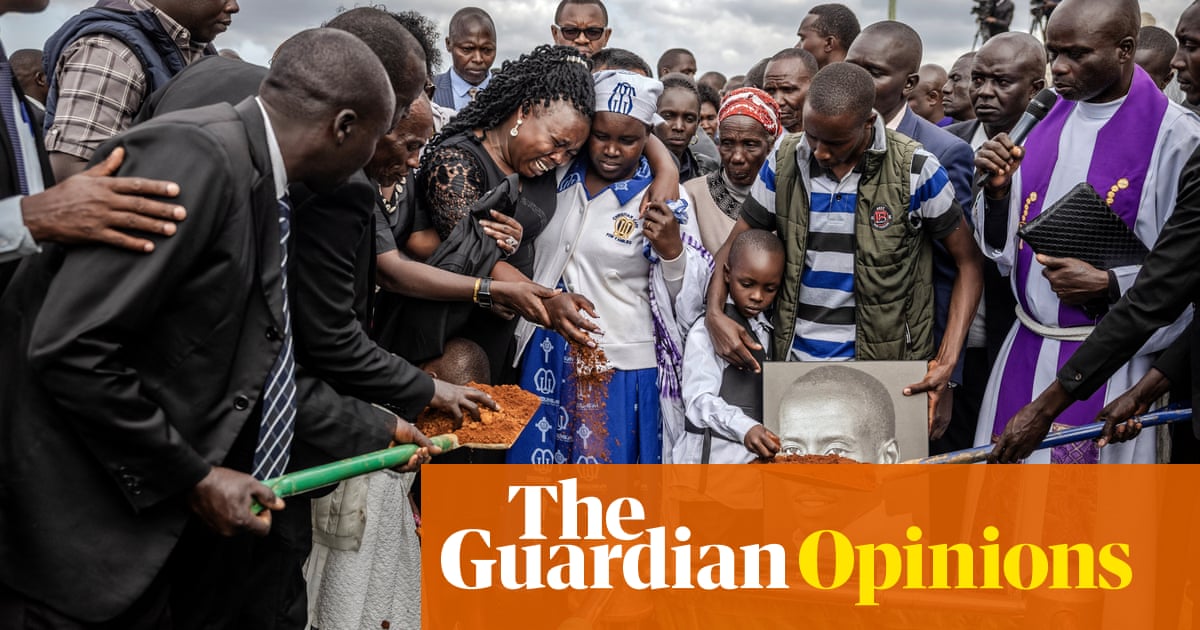
In February, Asenath Rotich became a widow, after the death of her partner, marathon runner and world record-holder Kelvin Kiptum, in a road accident. Unlike the majority of more than 8 million widows in Kenya, Rotich’s future is being provided for. The government has built her a house and is working to secure a job for her so she can care for her two children.
In contrast, consider the recent case of Silvia that was shared with me by a community radio journalist. Silvia is a 39-year-old widow with five children, whose home in Siaya County was demolished during a land ownership dispute. Despite widespread media coverage and public outcry, justice remains elusive for her.
As east Africa is plagued by instability and conflicts, the number of widows is rising, but they are not afforded adequate rights. Widows frequently encounter discrimination – not only socially, but also when it comes to inheritance and property ownership. Widowhood rites, which are meant to honour the deceased and demonstrate the widow’s grief, can make women more vulnerable by subjecting them to marginalisation as well as psychological and physical indignity.
According to the World Widows Report by the Loomba Foundation, the global population of widows stands at a staggering 258 million, looking after 585 million children. About 38 million widows live in extreme poverty. This report was completed before the Covid-19 pandemic, which has exacerbated widows’ plight, as have ongoing conflicts such as those in Syria, South Sudan, Central African Republic, Ukraine and Gaza. The Boko Haram insurgency is reported to have taken a devastating toll in north-east Nigeria, south-east Niger, west Chad, and north Cameroon.
As a widow of 16 years, I intimately understand the myriad challenges. From enduring forced sexual cleansing rituals to grappling with stigma and being disinherited, I empathise with the deep-rooted injustices that widows confront daily.
These personal experiences fuel my commitment to the organisation I founded 12 years ago, Rona Foundation. We are dedicated to legal advocacy, economic support and emergency response initiatives, aiming to address injustices and promote women’s independence and wellbeing. I oversee the coordination of more than 9,000 widows in Siaya, which grants me a deep understanding of the triumphs and challenges within our movement to achieve rights for these women.
Most of our members endure persistent economic disparities, with many facing challenges such as harmful widowhood traditions, poor access to justice and difficulty obtaining social benefits such as pensions or insurance. A lack of legal and social protection perpetuates their vulnerability.
Our struggle isn’t just against societal norms, however. Grassroots organisations such as mine often struggle to survive due to resource scarcity.
Over the past decade, I’ve seen donor organisations provide our movement with short-term assistance, which of course helps, but not enough. This leaves us vulnerable to adversity and unable to sustain our efforts. Too often, movements such as ours simply starve and die. Clearly, we need those commitments, but we also need stability and, above all, long-term funding.
Despite such obstacles, there are glimmers of hope. This includes the recent recognition of widows by UN Women at the Commission on the Status of Women. Now they are framed as a category of women who face some of the greatest risks of rising poverty, food insecurity and violence. This recognition has taken years of advocacy to achieve, mostly by widow movements with few financial resources.
after newsletter promotion
The establishment of the African Widows Summit also offers hope for the future. It brings together widow-focused organisations, and next meets in June in Zanzibar.
Recently, I championed the election of three widows as legislators in my county, and I have mobilised thousands of women to support landmark legislation aimed at advancing widow rights.
Hope Nwakwesi, the president of the African Widows Summit, is working on advocacy, too. “In Nigeria, we are dedicated to inspiring widows to advocate for their rights and urging governments to take decisive action to empower them,” she said.
Until widows have adequate rights, Africa will not achieve the UN’s sustainable development goals by 2030.
Will we get there? I try to remain hopeful.
-
Roseline Orwa is founder of the Rona Foundation, a grassroots organisation in Kenya dedicated to widows’ rights